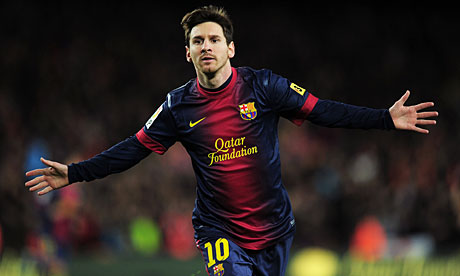Every generation of footballers sees those one or two special ones who tower above the rest. Leo Messi and Cristiano Ronaldo represent the brightest of their generation; Gareth Bale and Neymar, the one just after. These are people who have within them a unique ability to entertain, to push the human body to its limits, and to accomplish feats beyond our imaginations.
Yet the way we, and I say we in reference to those of us who are part of the media, treat these messiahs is ironic, and to a point, odd: we clamour to make idols of these exceptional talents; we shower them with accolades; we label them geniuses. And then we rush to knock them down; we hunt for flaws; we turn them into everybody’s favourite type of genius: the flawed genius.
Now exactly what is it that’s so alluring about the flawed genius? Because we don’t seem to be able to live with any other type, do we? Whenever there comes along someone who’s extraordinarily talented, we wait with bated breath to discover his shortcomings, his faults, vices, and weaknesses. And if we don’t find them, we delve deeper. And deeper. And deeper still, until finally we discover a tiny morsel, a grain, just a crumb of a misdeed. And then, in jubilance, we trumpet it to anybody in the world who cares to listen.
And boy do they listen, because finally the illusion of perfection has been pricked. We initially embrace the genius and the apparent model of perfection in its nascence. But as time passes us by, and nothing emerges to suggest that he’s not as perfect as we thought, not as gifted, not as talented, we are unnerved. Maybe because it means entertaining the thought that perhaps this particular individual is perfect, impeccable, and untainted by what makes us human – the curse to err.
See, the word genius, in its original sense, represents the guiding spirit or tutelary deity of a person. In other words, something that helps a human perform extraordinary feats, feats that are extra-human, as it were. And so a genius who is perfect, and makes no error is, over time, dehumanized.

He might have been (the) Best, but he erred too, just like the rest of us.
The English poet Alexander Pope famously said: “To err is to be human.”
And in the manner that A = B entails that B = A, Pope’s assertion also entails that to be human is to err. One who does not err, therefore, is not human. And that’s precisely what’s scary about perfection – it is unsettling because it implies that someone who finds it has lost the essence of humanity. And perhaps that is what lies at the heart of our desire to find something wrong with all the geniuses of the footballing world, or otherwise.
It must explain why we search so desperately for flaws in players we acknowledge as incredibly gifted. On the pitch, they’re so good it’s almost unbelievable. They hardly make an error. They come as close to perfection as anyone can. But accepting that he is perfect would also mean accepting that he is not human, because human-beings, by definition, cannot be perfect. Perhaps perfection, much like happiness, is something that can be pursued, but never truly attained.
Then we begin rummaging through his past, examining every bit of his existence, looking for a tiny transgression so that we can rest assured that he is only human after all. Knowing that lets us feel less detached. It comforts us that even the footballing prodigies who appear so immaculate, aren’t, in fact, perfect. And it allows us to identify with them.

Perfect on the field; maybe not, off of it. (Image Credit: The Guardian)
And so it was a relief to hear of Lionel Messi’s tax cock-up this past month . Nothing against the man himself – he comes across as a genuinely sincere and humble individual. But this was something that proved that he was capable of making mistakes. Whether he intentionally messed up his taxes is, in fact, irrelevant: if he did it intentionally, then, well, he’s dishonest and he got caught – far from perfect; if he did it unintentionally, then it was just a simple error. Either way, he made a mistake, he is not perfect, and therefore, he is only human. And that’s why it’s a relief.
All of that, though, is no excuse for the trial by public opinion that Messi is being subjected to at the moment, quite unfairly too. Even if we choose to ignore the judicial maxim of ei incumbit probatio qui dicit, non qui negat – the accused is innocent until proven guilty – Messi’s near-spotless record, on and off the field, must count for something. We’re not talking about a serial offender here; he deserves to be given the benefit of the doubt. Let due process run its course before castigating, or sympathizing with him.
Everyone makes mistakes. Even as Messi is capable of pulling off extra-human feats on the field, he remains human off it – and that means he remains, like we are, prone to the occasional error. And that is something we should appreciate, along with all that it entails.



















